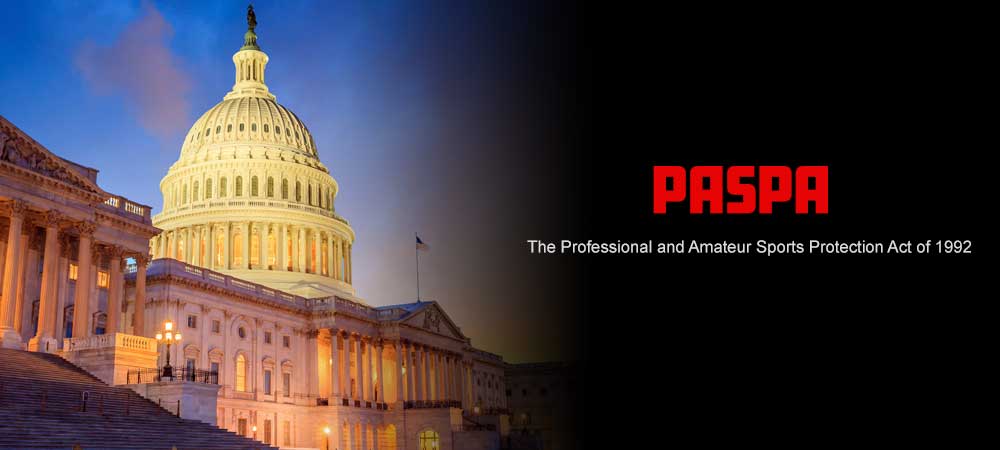- The Professional and Amateur Sports Protection Act of 1992 (PASPA) was enacted as law on October 28, 1992.
- Since it’s repeal in 2018, billions of dollars have been made in combined revenue from the legal sports betting industries across the United States.
WASHINGTON – October 28 marks what would’ve been the 28th anniversary of the Professional and Amateur Sports Protection Act of 1992 (PASPA) had it not been repealed in 2018. Its repeal left the US sports betting market open to any state that welcomed such an industry.
A number of states scrambled to get legislation drawn up as soon as PASPA was overturned on May 14, 2018, by the Supreme Court.
Up until that action was taken, US sports bettors couldn’t legally get any local action on sporting events for over 25 years unless they were living in Delaware, Montana, Nevada, or Oregon which were exempt from being part of the federal law at the time it was enacted in 1992.
But, the effects of PASPA are still being felt today in ways the sponsors of the bills never imagined.
What PASPA Did In The United States
For over a quarter of a century, PASPA’s purpose was to prohibit 46 states in the nation from engaging in gambling on sporting events.
There are a number of theories as to why PASPA came to be, from issues over organized crime having a hand in sports betting in the United States to Atlantic City hoping to gain a monopoly on the pastime which never panned out as that theory would’ve suggested.
Of the four states grandfathered into being allowed to have sports wagering, only Nevada truly had real sportsbooks. Delaware, Montana, and Oregon had sports betting style lotteries of sorts but no real sportsbook operations, which left them banned in that sense with most of the country because they couldn’t add on to their existing markets at the time.
The immediate and direct effect of the bill gave Nevada a monopoly over single-game sports betting and shut out any other state from being able to compete. Gambling on sports became synonymous with Nevada.
While PASPA was created in 1992, lawmakers could never have anticipated the future of the internet and the monumental role it would play years later for American sports bettors.
No true laws existed that stopped US citizens from betting on sports with offshore internet sportsbooks. Once people in the nation realized they could legally use these outlets to wager on games, millions upon millions of dollars were put into these sports betting operations overseas.
This was one of the contributing factors in the eventual repeal of PASPA, which was nine years in the making with initial proceedings beginning in 2009 by the people of New Jersey.
Lawmakers also knew of the activities taking place with international operations and how that money was all lost to other countries rather than gained in revenue for the economy of the United States.
That, coupled with the state’s rights issues presented to the U.S. Supreme Court led to the eventual repeal that occurred in 2018.
And with that final judgment, legal sportsbooks began to pop up across the country soon after.
The US Sports Betting Market Today
Once PASPA became a thing of the past, the popularity of the sports betting industry spread like wildfire.
Almost every state started making proposals to discuss within their legislative sessions and began to pass bills writing sports wagering into law. Two years after the ban was lifted, 23 states have legal sports betting markets of their own, and more are expected to be coming in the future.
Overall, billions of dollars in revenue combined from these legal states have been made in just two years of being opened markets.
Wagering on sports is a lucrative business as can be perceived by the revenues acquired in the nation since 2018. And the integrity of the games has never been an issue like states trying to get a legal industry off of the ground have often worried about.
Instead, professional sports leagues such as the NBA, MLB, and NHL were quick to sign partnerships with legal sportsbooks. Individual team’s of these leagues also signed deals with sports betting operators.
Proponents legal sports betting argue that having a transparent, consumer safe, legal sports wagering market for constituents across the US has not only ensures the safety of American sports bettors but has been a welcome revenue stream for all of those that now have legal industries.
The overturning of PASPA is now also allowing states to gain extra tax revenue in a time when state budgets are in the deficit and are struggling to find funding in a COVID-19 stricken economy. With that in mind, it’s widely assumed that a bill like PASPA will never come again. In short, Happy Anniversary, PASPA, you had a good run.
Advertising Disclosure
In order to provide you with the best independent sports betting news and content LegalSportsBetting.com may receive a commission from partners when you make a purchase through a link on our site.
News tags: Atlantic City | Delaware | Montana | Nevada | New Jersey | Oregon | PASPA | Professional and Amateur Sports Protection Act of 1992 | US Supreme Court

Christina has been writing for as long as she can remember and does dedicated research on the newly regulated sports betting market. She comes from a family of sports lovers that engage in friendly bets from time to time. During the winter months, you can find Christina baking cookies and beating the entire staff at Mario Kart…the N64 version of course.


 College Football Betting
College Football Betting Best Online Sports Betting
Best Online Sports Betting Best Legal NFL Betting
Best Legal NFL Betting States With Legal Sports Betting
States With Legal Sports Betting Sports Betting Events
Sports Betting Events




